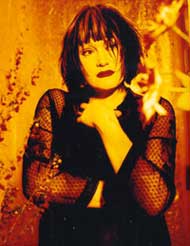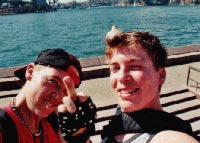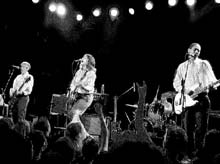Attending Ladyfest Los Angeles, the most recent addition to the wave of Ladyfest conferences that have popped up across the United States and the U.K. in the last two years, I found myself considering what measures can define the success of large-scale feminist activities. If the quantity of attendants were used as a measure, for example, Ladyfest Los Angeles might not be consider a successful event, as the completely unexpected rain for the first two days of the conference severely cut down attendance. Additionally, LFLA did not have the same “star power” (i.e. Le Tigre or Sleater Kinney) as Ladyfest Olympia or San Francisco. However, in my opinion, LFLA achieved success on a level that I, a fairly recent transplant to Southern California, never thought possible: it made something feminist, political, and, at times, confrontational happen in Los Angeles, a city known more for superficiality and cell phones than punk rock feminism.
The idea for Ladyfest began in Olympia, Washington in the summer of 2000. A close cousin to 1990s Riot Grrrl conventions, the first Ladyfest event lasted for four days and incorporated a wide variety of musicians, feminist workshops, panel discussions, and art. Since this event, Ladyfests (linked only by name and idea) have emerged in San Francisco, Chicago, Northampton, Glasgow, Scotland, and, finally, Los Angeles. LFLA, organized through grassroots networks of feminists in the LA area, featured panel discussions, musical performances, hands-on workshops, film and art presentations, and spoken word. Tickets for the entire four-day event were $60 and individual day passes were also available at a reduced rate. The events were spread across two locations in downtown LA, the Palace Theater and the Spring Tower Bank building. These locations worked out well, as they were in close proximity to one another and there was a great deal of easy parking (a luxury in Los Angeles) near each building. The majority of the musical performances were at the Palace, while the Spring Tower held most of the panels, workshops, and films.1 The proceeds of the entire event went to the East LA Women’s Center, a non-profit organization that provides domestic violence and rape crisis services.

While the musical line-up of LF LA did not have Exene Cervenkathe kind of big name “star power” that might entice local scenesters not interested in feminism to venture into downtown LA, the event showcased a juggernaut of local LA talent. The Friday night musical line-up (which unfortunately was sparsely attended due to rain) was a key draw of the event, as it encompassed a performance by Exene Cervenka, the former frontwoman of the LA punk band; X, a musical performance by Phranc, the Jewish lesbian folk singer; and a performance by the Disposable Boy Toys, a Santa Barbara drag troupe. For spoken word talent later in the weekend, Francesia Lia Block, favorite author of gothic girls across the country, performed on Saturday and Pleasant Gherman, an LA punk staple since 1977, read from her new book on Sunday. LFLA also incorporated new LA talent, such as recent LA-transplant, Jody Bleyle of Hazel and Team Dresch fame, who played with her new band, Family Outing, on Sunday night.

In regards to the musical performance, Sunday evening at the Palace turned out to be the big night for music, as it featured amazing performances from the Portland punk duo the Haggard, Family Outing, and Sextional—all up-and-coming queercore bands. Before the Haggard played, the audience seemed to be dragging, doubtlessly worn out by a long day of workshops, panels, and activities. The Haggard had so much energy, however, it spawned a mini-mosh pit and got the rest of the audience on their feet. Additionally, by providing lyric sheets to the audience and talking about what each of the songs were about, the Haggard invoked early Bikini Kill shows and the spirit of audience involvement that came with a lot of Riot Grrrl-associated bands. After the Haggard, Jody Bleyle and her brother Allan put on a great show with their duo Family Outing, complete with matching purple ponchos for part of the set. Sunday evening wound up with a set by LA-based singer Mia Doi Todd followed by a performance by experimental music darlings, Deerhoof, which brought a great end to a long day of events.
Despite the enthusiastic end of Sunday’s musical performances, however, Monday’s concert was a wash in terms of attendance, a telling sign that a four-day event may just be too much for even the most devoted feminist. When I first arrived at the Spring Street Tower, the Squeaky Toys, an LA local band, were valiantly playing their hearts out to an audience of five. While this initially seemed heartbreaking—a signal of people’s apathy toward local bands—as the day progressed, the small audience (which had grown to about 40 by early evening) began to interact with the performers, giving the evening a friendly dynamic.The highlight of the evening was The Tamalas, thrown together for the express purpose of playing LFLA. The singer began with a beautiful, punky rendition of Lois’ “Strumpet” and proceeded to get Jody Bleyle and several other audience members on stage to sing. The boundaries between audience and performers became fuzzy at this point and for the rest of the evening a sense of community and inclusiveness seemed to emanate from interactions between the stage and audience, which gave the close of LFLA a last-night-of-summer-camp feeling.
Despite the great musical performances of LFLA, the most amazing part of the event turned out to be the panel discussions. The first panel I attended was on the exclusion of transsexual women from the Michigan Womyn’s Festival (MWF). The festival, known affectionately as “Mich” to many long-time attendees, is a womyn’s music festival that emerged from lesbian feminist separatist movements in the 70s. In the beginning, the festival showcased “womyn’s music,” such as Helen Reddy and Holly Near. In recent years, it has included more queercore/feminist punk bands, though there has been a great deal of controversy over bands like Tribe 8, who make technically “lesbian” music, but feature S/M stage shows.2 This controversy was followed by another over who counts as a womyn in the context of the festival. Held on private land owned by organizer Lisa Vogel, the festival has been a separatist space for “womyn-born-womyn,” meaning that male-to-female transsexuals are not welcome.3 The exclusion of MTFs is based largely on the writings of Janice Raymond, a lesbian separatist who wrote a scathing book about transsexuality in the 1970s that positioned MTFs as the ultimate form of colonization of women’s bodies. Raymond argued that MTFs—whom she saw as created by the patriarchal medical establishment to infiltrate lesbian separatist spaces—are never able/willing to give up male privilege, and therefore must be excluded from “women’s spaces.” Raymond’s book, while discredited by many scholars since, still stands as the final word on transsexuality for many older lesbian separatists. Beginning in the early 1990s, however, transgender activists and feminists unhappy with the policy have been protesting outside of Mich at a second festival known as Camp Trans.

It was this exclusive policy that the discussants, Sadie Crabtree, an activist leading the fight to change the policy; Julia Stewart, a union organizer; and Sarah Douger and Tami Hart, both Mr. Lady recording artists, took on. The panelists started from the same position: the policy is wrong. However, there was wide variety in what to do from this starting position. Crabtree has been leading the boycott on the Butchies, a band on Mr. Lady records, who played Michigan and supported the policy in a press statement. The boycott has divided the queer/feminist community. Many are hesitant to speak out against Mr. Lady, a record label that distributes queer/feminist music such as Le Tigre, as they are an integral part of the community. Stewart, Douger, and Hart, while equally against the policy, represented the anti-boycott side of the argument, questioning the usefulness of this tactic and advocated instead for transgender education, arguing that the policy is based on simple ignorance about transgender women. While the panel was slightly marred by a moderator who seemed either bored or somewhat apathetic, the discussants managed to have a lively discussion that raised issues about feminism and separatist spaces. In between comments from panelists, the audience jumped in to express agreement, consternation, and at times vehement defenses of the importance of Michigan as a feminist space, making the panel very interactive.
What was so fascinating about this panel was that it revealed a dirty secret of queer and feminist politics: not everyone means the same thing when they use the word “feminist” or “queer.” For instance, the Butchies are a “queer” band and display a lot of “gender-bending” behavior both live and on their album covers. However, their support for Michigan illustrates that not everyone sees transgender inclusion as a goal of queer feminist activism.4 Stewart summed this up well by positing that the boycott of the Butchies came from a feeling that they should be trans-allies and a deep disappointment that they were not. While the questions of what to do with Michigan, the Butchies, the policy and the boycott were not ultimately resolved at the end of the panel, it left the audience with a lot to ponder and gave LFLA the distinction of being the first Ladyfest to tackle this issue head on.
The gender panel on Sunday afternoon was equally compelling. Again, the line-up was full of Southern California academic stars, including Talia Bettcher, a professor of philosophy at Cal State LA, and Judith Halberstam from UC Irvine. The entire panel dealt with trangender issues, from the transgender gaze in art and film, to the production of a short comic film on the experiences of FTMs. While quite an excellent presentation, however, it did not escape my attention that all the panelists were white (as were all the panelists on the Michigan panel, with the exception of the apathetic moderator). The whiteness of the presenters seemed to raise alarm bells for some audience members, as one of the only questions posed to the presenters was, “What about race and class?” Judith Halberstam took this question and gave a great answer about the dangers of simply adding race and class on, just for the sake of avoiding this question. However, while her point was valid, it did not seem quite satisfying in the light of the complete lack of discussion of race, as each panelist, in response to this question, spoke only to how their presentation answered questions about class.
The lack of inclusion of race from the gender panel was reminiscent of early Riot Grrrl conventions, where race was either addressed in a cursory fashion or completely left aside. I had noticed when I arrived at LFLA that there was an entire panel on women of color, entitled “Sister My Sister: Women of Color Speak Out.” In an act of complete irony, however, this panel was opposite Judith Halberstam’s discussion of “Punk Rock, Riot Grrrl, and Drag Kings.” As to be expected, the Sister My Sister panel was composed only of women of color (and held in a very small room).5 Halberstam’s talk, on the other hand, had a large, predominantly white audience. To me, this was the only disappointment of LFLA as it signaled that while transgender issues have come to the forefront of feminist/queer activism, it remains difficult to incorporate race (and racism) into the discussions in a non-additive way.
The difficulties over incorporating race into discussions about gender at LFLA speak to the current state of feminist/queer activism. The experiences of women of color in feminism and queer studies still appear to be marginal in relation to what gets positioned as the “real” issue: gender. This marginalization of race may explain why transgender issues have become so salient in this queer/feminist community: it is perceived as continuing to talk about gender, not race. This feeling that transgender is only a gender issue may stem from the fact that the majority of well-known transgender activists, such as Kate Bornstein, Ricki Ann Wilchins, Leslie Feinberg, Patrick Califia, are white. The ways in which race and class affect transgender individuals, in the face of all this focus on gender, gets left out. Additionally, working for inclusion in regards to the transgender community allows the feeling of unity to be brought back into feminist/queer activism in a way that race may not, as writings by many feminists of color have shown that inclusion is not the goal but rather transformation. As with the MWF panel, a certain uneasiness pervades feminist/queer spaces when disharmony is suggested. Indicative of this, to me, was the fact that none of the audience members asked Talia Bettcher about her performance, which was a riveting, at times extremely harsh (and right on in my opinion) critique of how the “T” of LGBT is just given lip service rather than made an integral part of the community. Thinking about all these issues, I was left with the sense that while LFLA was at least having panel about race and taking on transgender inclusion, there still needs to be major work in feminist/queer circles on learning to talk about differences in a productive way that does not assume that every member of the community has the same issues and concerns.
Going back to the question of the measure of success that I posed at the beginning, however, the quality of LFLA, despite the inability to produce productive strategies for incorporating race issues into gender and transgender panels, marks a resounding victory for feminists/queer activists in Southern California. First, LFLA drew on community resources in panels and talent, put a focus on new kinds of activism, such as labor and transgender activism, and gave back to the community by supporting the East LA Women’s Center. Second, the event was well organized, with very few glitches in the execution of the event. Third, LFLA upheld the legacy of Riot Grrrl/queercore by providing an arena for feminist/queer music and performances, which hopefully in turn will inspire a new generation to pick up drum sticks and guitars to sing their own lives. It also showcased a wide variety of topics and did not shy away from confrontational issues like the boycott of Mr. Lady Records or trans-exclusive policy of the Michigan Womyn’s Festival. Finally, and most importantly to me, it signaled that punk rock feminism and queer activism are alive, well, and possibly coming soon to a Ladyfest near you.
Kristen Schilt
University of California, Los Angeles
Works Cited
Kearney, Mary. “The Missing Links: Riot Grrrl, Feminism, Lesbian Culture.” Sexing the Groove: Popular Music and Gender. Ed. Sheila Whiteley. London: Routledge, 1997.
Williams, Janice G. The Transsexual Empire: The Making of the She-Male. Boston: Beacon Press, 1979.
- The best part of the location of LFLA was the exposure it provided to downtown eating establishments, such as my new favorite cafeteria, Clifton’s. A staple of downtown LA since the 1920s, Clifton’s provdes cheap food within a priceless, kitschy decor. I highly recommend the pumpkin pie. ↩
- For a good overview of this controversy, see Mary Kearney’s article. ↩
- As a side note, this policy is loosely enforced, as there are not strip searches of suspected transsexuals. However, transgender activists who have “secretly” entered the space have had to suffer from the fear of being outed. ↩
- The Butchies position was actually unclear from this panel. Crabtree argued that they supported the policy. However, I had been under the impression that they supported Michigan’s right to continue its tradition as a separatist space, not necessarily the policy. Again, it is a tricky, slippery issue. ↩
- Not being involved in the organization of LFLA, this could have been a separatist panel that was supposed to only be women of color. However, based on the anger about the separatist space of Michigan, it seems unlikely that it was organized in this way. ↩
